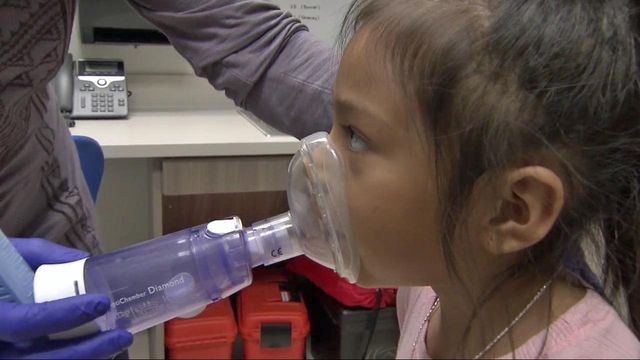As student medical needs mount, school nurses in short supply
North Carolina has 115 school systems, but just five of those systems have a nurse dedicated to every school, which works out to one nurse for every 1,086 students.
Posted — UpdatedWith more and more children needing help with complex medical issues, that ratio can have consequences for school staff and students.
Roxanne is a kindergartener who has to manage her asthma while at school. Cynthia Coats is not Roxanne's school nurse—she's a clerical assistant in the office at Raleigh's Brooks Elementary school—but she has to help deal with students' medical needs.
Coats said she spends about half her day handling medical needs. This year, she had to give a student a shot.
"I gave a shot for the first time last year," Coats said. "I had a few tears when that happens, but it was good. Not things that I normally thought I would ever do."
Like most public schools in North Carolina, the school nurse is at Brooks Elementary on some days. But there are other students at other schools to take care of, too.
"I do Monday, Wednesday at one school," said nurse Jenifer Simone. "Tuesday, Thursday at the other school, and then I split my Friday between the two"
According to North Carolina's Department of Health and Human Services, the average school nurse covers two to three campuses, though some cover as many as six. Those ratios leave a lot of student medical care in the hands of school staff.
In September, Courtney Frederick's 5-year-old ended up in an emergency room after a bookkeeper at a Harnett County Elementary school mistakenly gave her daughter, Malia, a double dose of an ADHD medication prescribed to a different student.
"I was in disbelief, actually," Frederick said. "I was really mad."
Frederick attributed the mix-up to school staffers overwhelmed.
"Something went totally wrong," she said. "I think they were rushing and doing too many tasks at one time."
A receptionist at Eastern Wayne Middle School also expressed concerns. She told WRAL News, "the amount of medicine I give on a daily basis would stun you!" She said she was even stuck by a used lancet after a student tested their blood sugar.
While there is no training standard, each school nurse trains staff on how to administer first aid and how to give medicines. But the list of medical needs in modern classrooms is growing longer.
Research from the DHHS shows the average classroom has:
–Two students on medication
–Two with asthma
–One with an attention deficit disorder
–One with a life-threatening allergy
–One student with a less common health condition, such as cancer, a feeding tube or a bleeding issue.
At Brooks Elementary, a thick binder helps staff track all the medical needs of their students.
"So, these are all our students who have medical conditions in school," Simone said.
Simone can be reached by phone no matter which school she's visiting, but she acknowledged a difference in being there in person.
"Not that the clerical staff can't do it, but I am going to think of something differently," Simone said. "The same way that I wouldn't want to go into a classroom and be a teacher because I don't have education related to teaching."
As for Malia's scare getting the wrong medication, Harnett County School spokeswoman Natalie Ferrell told 5 On Your Side it was "a very rare case" and the school would "have another training just to pinpoint a situation like this."
Ferrell added, "things do happen, and when they happen, it'd be good to know how to take action to correct the situation or prevent it."
Frederick feels the best prevention is for schools to have full-time nurses.
"I feel like if (the nurse) was there, that wouldn't have never happened ... because she's managing the nursing. She's not doing the front desk. She's not doing copies. She's not checking out students. ... She's strictly doing medicine," Frederick said.
Only one school system in the WRAL viewing area has a full-time nurse in each school: Orange County. The NC Nurses association said that was the result of an effort by parents to have a full-time nurse on campus.
• Credits
Copyright 2024 by Capitol Broadcasting Company. All rights reserved. This material may not be published, broadcast, rewritten or redistributed.





